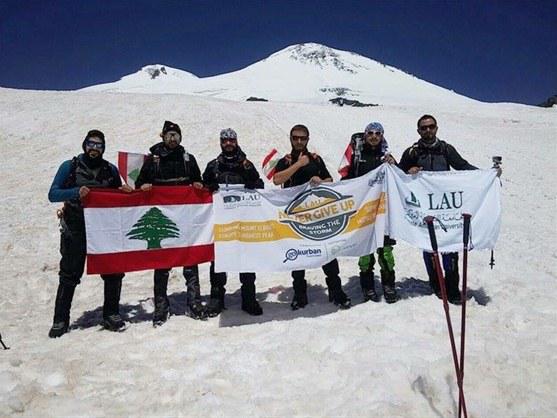
Seven Lebanese climbers recently ascended the highest peak in Europe in solidarity with children undergoing cancer treatment, to encourage them to keep on fighting. The climbers are part of the Never Give Up project run by the Lebanese American University. Never Give Up, a group made up of both LAU students and staff, in cooperation with the non-profit organization Children Against Cancer (CHANCE), climbed Mount Elbrus in Russia – which stands at 5,642 meters above sea level – on Aug. 1.
The climb illustrated to the children both the struggles of enduring the “tough” trip up the mountain, and the possibility of finally reaching the summit, Alan Keyrouz told The Daily Star.
“We’re proving to these kids, no matter how hard, difficult or tiring, nothing is impossible,” he said.
“Before we traveled, we [met] with the children. [They were] a great motivation. We sent videos to them and they [or their parents] responded with messages,” the 43-year-old mountain climber said.
During the climb, the group regularly uploaded videos to social media directly addressing children suffering from cancer to express their support. The latest video was uploaded to Facebook on Aug. 1.
Clad in warm clothes, perched on top of a snow-covered peak, with other mountains stretching out behind and below them, five people look directly into the camera as the wind whistles past. “Guys, we just reached the top!” the cameraman says, to rapturous applause and cheers from the mountaineers in the frame.
“Hi – as we promised, we never gave up, we’re at the top. We fought against all odds, we did what we could and we did not stop. It was a tough, very difficult climb, everyone was tired, but we did do it. And we expect that from you,” a visibly tired Keyrouz, the coordinator of the climb, said as he stood on the top of the mountain.
Nine-year-old Yasmina, diagnosed with Leukemia, remembers the visit from the Never Give Up climbers fondly. “I was too happy! I felt they were supporting me, it was very important,” she told The Daily Star.
The visit and the ongoing video messages sent from the mountain helped her go through her own treatment, she said, and sent a message to the climbers. “Thank you for supporting every child with cancer and including me,” she said.
The mountain climbers each sent messages to the kids, either shouting things from the top of the mountain that the kids wanted to scream themselves, or other, more personalized, videos.
“I was opening [Instagram] everyday, checking for messages,” eight-year-old leukemia patient Amal said. One particular video really brightened her day. “I was extremely happy. This year I couldn’t go to the beach, so [in the video] they came up the mountain and saw a lake and said, ‘You’ll go to the beach next year.’”
Such gestures are very beneficial for children suffering from cancer, according to the founder of CHANCE, Dr. Roula Farah.
“Visiting [the children] gives them hope [and makes them] feel like they can survive anything,” Farah told The Daily Star.
Farah’s specialization is in paediatrics and oncology, and launched CHANCE to provide both financial and emotional support to children with cancer. An integral part of recovery is willpower, she said.
“They have to have the will to survive, to keep on fighting and not give up. Data shows people with positive thinking are [more likely to] recover,” she said.
There’s light at the end of the tunnel: the most recent survival rates for children with cancer in Lebanon are between 59 and 90 percent, according to the Children’s Cancer Center Lebanon.
Every year, around 300 children in Lebanon are diagnosed with cancer, according to Farah, and the treatment is taxing on children. “They don’t like to swallow pills – it’s annoying for them to take medicine every day,” Farah said. “Going through treatment is like climbing a mountain.”
Just as the children gain strength from the climbers, the mountaineers, in turn, are motivated by the children. “The kids gave us power, strength to reach [the top]. Everyone has motivation – ours was [the children],” climber Richard Bshara said.
On the ascent, the group encountered storms, with winds blowing at 60 kilometers per hour and temperatures dropping to minus 18 degrees Celsius. In addition to the intense weather, the climbers had to contend with a 50 percent drop in oxygen compared to sea level.
“It was tough, but worth the experience,” Bshara said. He is looking forward to visiting the children once more, to tell them stories from the climb – about the storms they endured and what pushed them forward. Bshara added that his visits to the children are rewarding because of the joy his stories evidently bring them. “The smiles you see on their faces are ... amazing. We’re going to go see them again,” Bashara said.
Before tackling the mountain, the entire group trained for six months in order to prepare themselves for the Caucasus trek. Scaling the mountain took seven days.
Getting to know one another, and particularly getting to know oneself better, is crucial for mountain climbing, Keyrouz said. When you’re hooked up to each other with ropes – willing to put your life in someone else’s hands – you need to trust in them, but also in yourself.
Keyrouz has been up mountains before and has a lot more experience than many of the other climbers, who are mostly students aged 19-25.
When asked what he personally achieved during the hike, Keyrouz laughed and said: “I got to the top.”
The Never Give Up project is already planning its next trip, which most likely will scale Argentina’s Aconcagua Mountain – which reaches 6,961 meters above sea level.
Source: The Daily Star
 FR
FR EN
EN AR
AR








